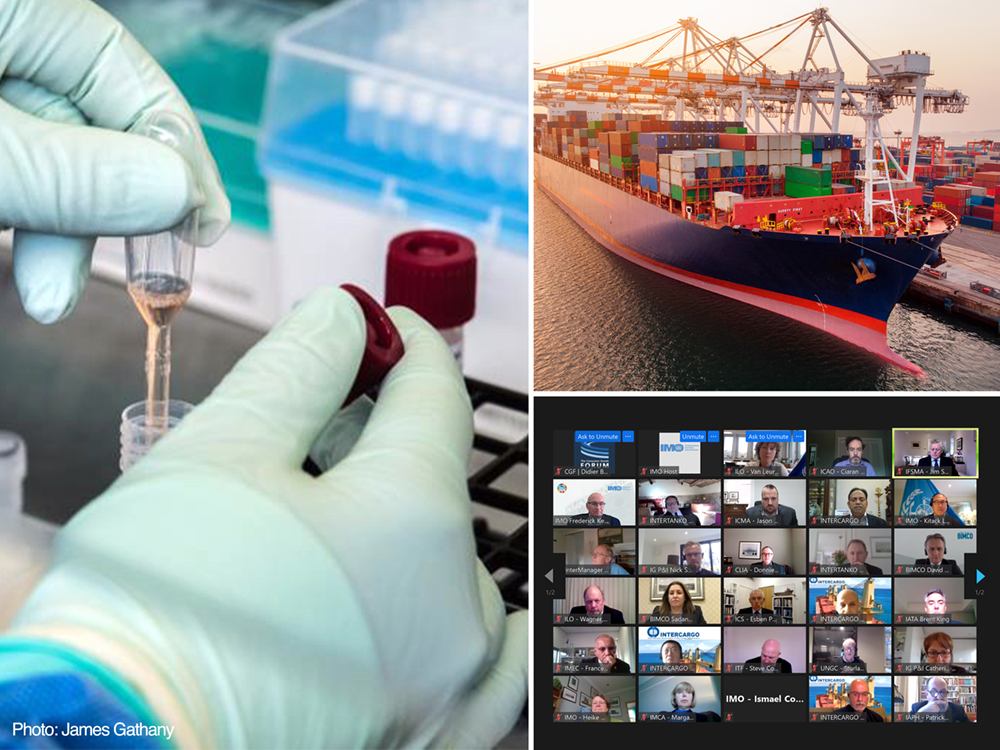The availability of COVID-19 vaccines and rapid, standardised testing for the virus could be crucial in helping to resolve the ongoing crew change crisis. However, a meeting of a cross section of UN agencies, shipping organizations, unions and maritime and logistics businesses, agreed that the focus needs to be on developing a range of practical solutions.
Some 400,000 seafarers are stuck at sea, months beyond their contracted time, with increasing reports of severe fatigue and mental distress. A similar number of seafarers are trying to join ships to begin contracts, but transit to and from ships is being thwarted by travel restrictions and limitations imposed due to the pandemic.
The roundtable meeting (13 November), hosted by IMO Secretary-General Kitack Lim, provided an opportunity for a frank exchange of ideas on how to move forward. Among the proposals discussed were further pushes to implement public health corridors, regional implementation of protocols to allow ports/airports to facilitate crew changes and the concept of a tamper-proof digital health passport or certificate for seafarers.
While there has been some progress, more countries need to designate seafarers as key workers and give them the rights that essential workers are given for travel and transit. Ongoing work to raise awareness of the crew change crisis at the political level and beyond, including a focus on the human rights of seafarers, is still needed, participants said.
Mr. Lim highlighted IMO and collaborative efforts to continue to keep the crew change crisis on the agenda, with ongoing bilateral meetings with countries; regional webinars to raise awareness and share best practices; and moves to get a UN General Assembly resolution adopted.
Around the (virtual) table, the desire to work together to resolve the ongoing situation remained high, with a real concern for the wellbeing of seafarers, for their human rights, and for the heightened risk to safety at sea. Fatigue among seafarers remains a critical concern. Numerous individual cases - including those reported to IMO’s Seafarer Crisis Action Team - highlight a desperate need for action, not words. Many participants expressed concern and condemnation about recent examples of some companies insisting on “no crew change” clauses in contracts, a practice which exacerbates the crew change crisis and further threatens the safety of navigation.
Additional meetings on specific work streams will be arranged, to discuss the practical aspects of the various proposals discussed and ensure solutions and initiatives are taken forward.
The meeting was attended by heads and representatives of: BIMCO, Consumer Goods Forum (CGF), Cruise Lines International Association (CLIA), International Association of Ports and Harbors (IAPH), International Air Transport Association (IATA), International Civil Aviation Organization (ICAO), International Christian Maritime Association (ICMA), International Chamber of Shipping (ICS), International Federation of Shipmasters' Associations (IFSMA), Institute for Human Rights and Business (IHRB), International Labour Organization (ILO), International Marine Contractors Association (IMCA), International Maritime Employers' Council (IMEC), IMO, International Association of Dry Cargo Shipowners (INTERCARGO), International Ship Managers’ Association (InterManager), International Association of Independent Tanker Owners (INTERTANKO ), International Transport Workers’ Federation (ITF), International Group of Protection and Indemnity Associations (P & I Clubs), Sustainable Shipping Initiative (SSI), Trafigura, UN Global Compact (UNGC), World Shipping Council (WSC).
